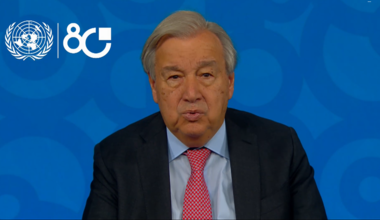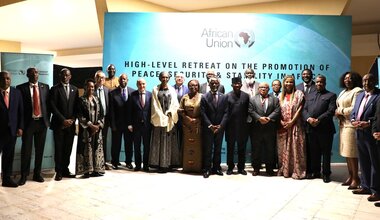AUPSC COMMUNIQUÉ | 1214th Meeting on Artificial Intelligence and its Impact on the Peace and Security in Africa
On 13 June, the AU Peace and Security Council (AUPSC) dedicated its 1214th meeting to a discussion on ‘Artificial Intelligence and its Impact on Peace and Security in Africa’. Referencing the Common African Position on the Application of International Law to the Use of Information and Communication Technologies in the Cyber Space, alongside its communiqué of 4 August 2022 on ‘Emerging Technologies and New Media: Impact on Democratic Governance, Peace and Security in Africa’ and other relevant policy documents, the AUPSC underscored the positive potential of Artificial Intelligence to ‘revolutionise societies’, while contributing to peace, security, stability, democracy and development in Africa.
The Opening Remarks were delivered by Ambassador Rebecca Amuge Otengo, the Permanent Representative of the Republic of Uganda to the AU and AUPSC Chairperson for the month of June, with an introductory statement delivered by Ambassador Bankole Adeoye, AU Commissioner for Political Affairs, Peace and Security. Dr. Amani Abou-Zeid, AU Commissioner for Infrastructure and Energy; Ambassador Abdel Latif Ahmed, Director General of the Cairo International Center for Conflict Resolution, Peacekeeping and Peacebuilding (CCCPA) and Co-Chair of NeTT4Peace; Bernardo Mariano Joaquim Junior, Chief Information and Communications Technology Officer and Assistant Secretary-General for the UN Office of Information and Communications Technology (UNOICT); Samson Itodo, from YIAGA Africa; and Dr. Kennedy Javuru, from Greater London Authority, all delivered remarks, alongside, statements by representatives of AU Member States and other International Organizations.
The AUPSC recognised the efforts of the AUC in exploring the role of Artificial Intelligence within the peace, security, and development nexus in Africa and in implementing the decision of the 44th Ordinary Session of the AU Executive Council, which endorsed the Commission’s proposed conceptual framework and tasked the AUC to expedite the development of a Continental Artificial Intelligence Strategy, while urging Member States that had not yet done so to ratify and domesticate the AU Convention on Cyber Security and Personal Data Protection (Malabo Convention) and, to actively engage in the development and implementation of national and regional Artificial Intelligence strategies that align with AU guidelines and principles. Read full communique below.
 UN
UN






